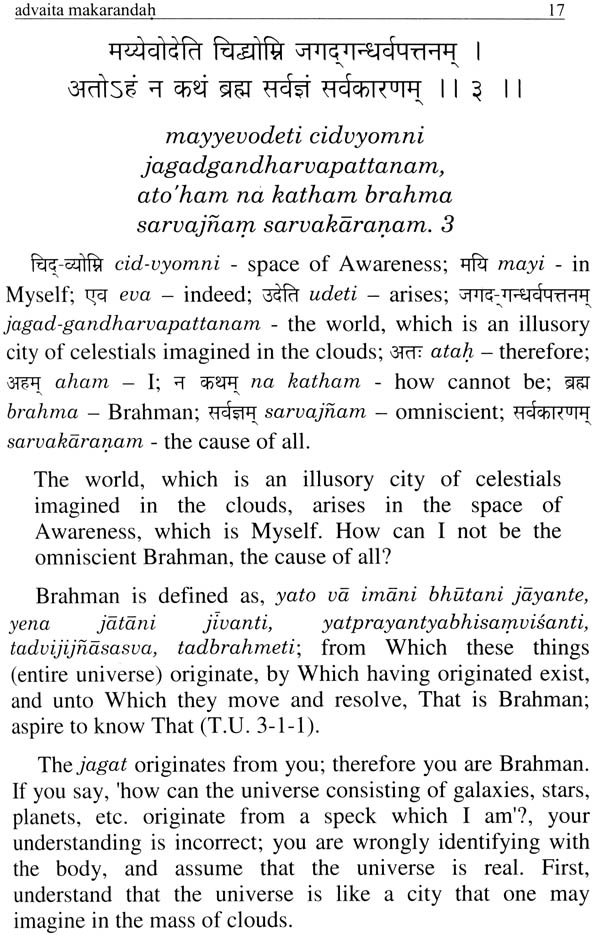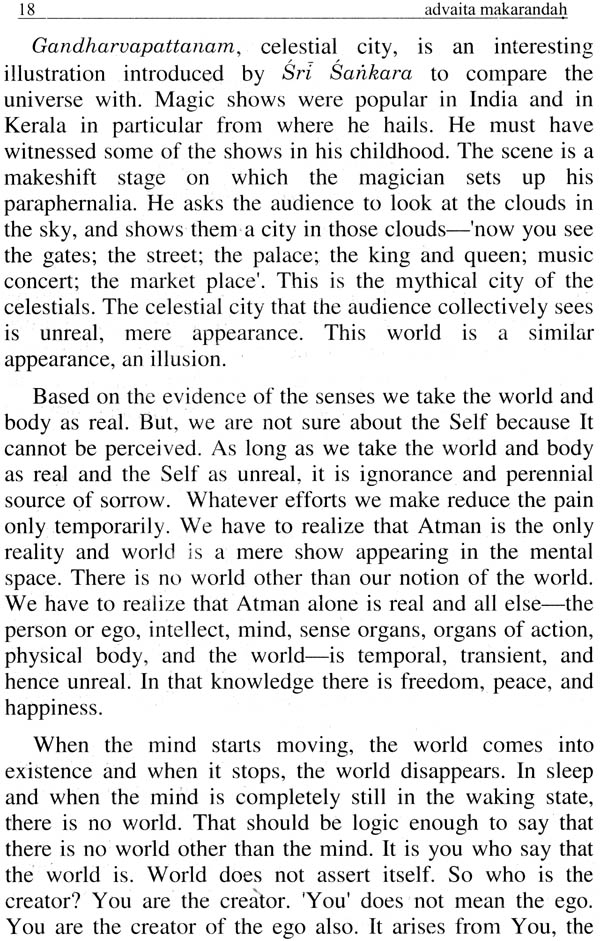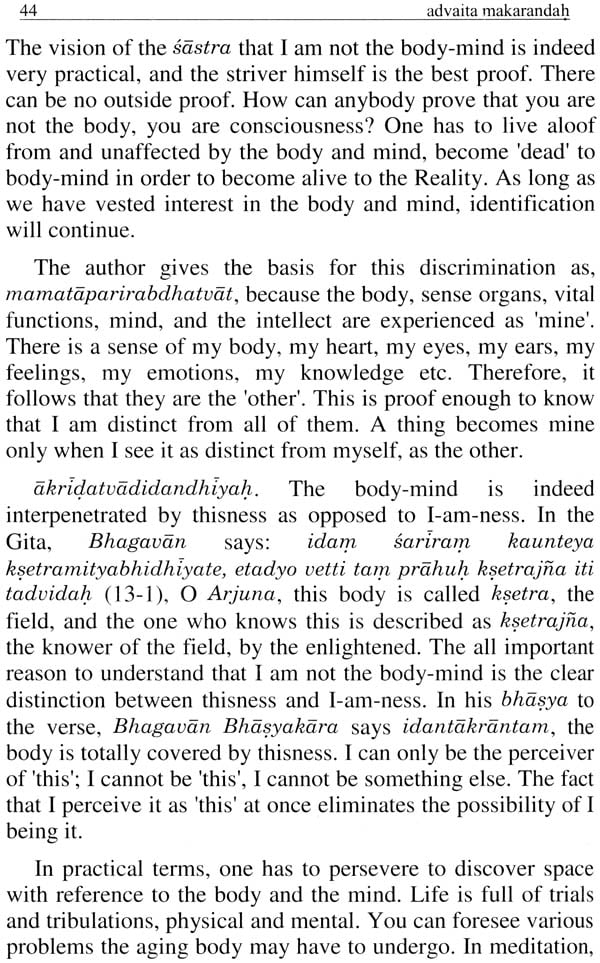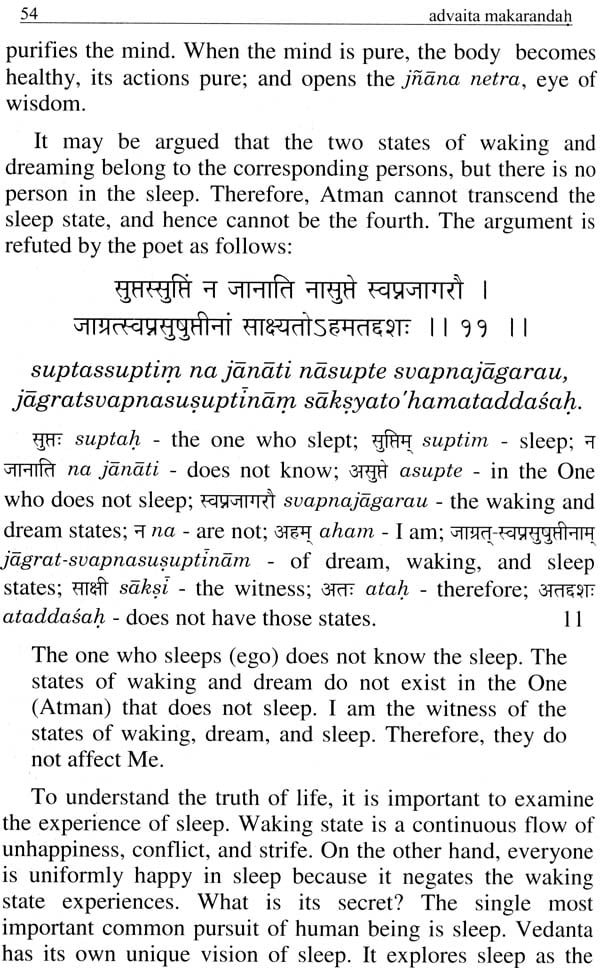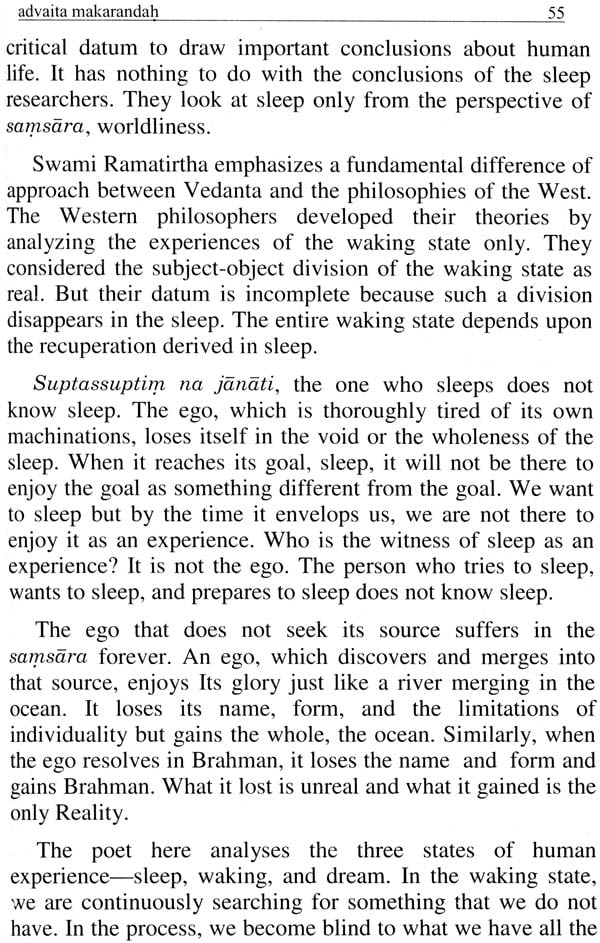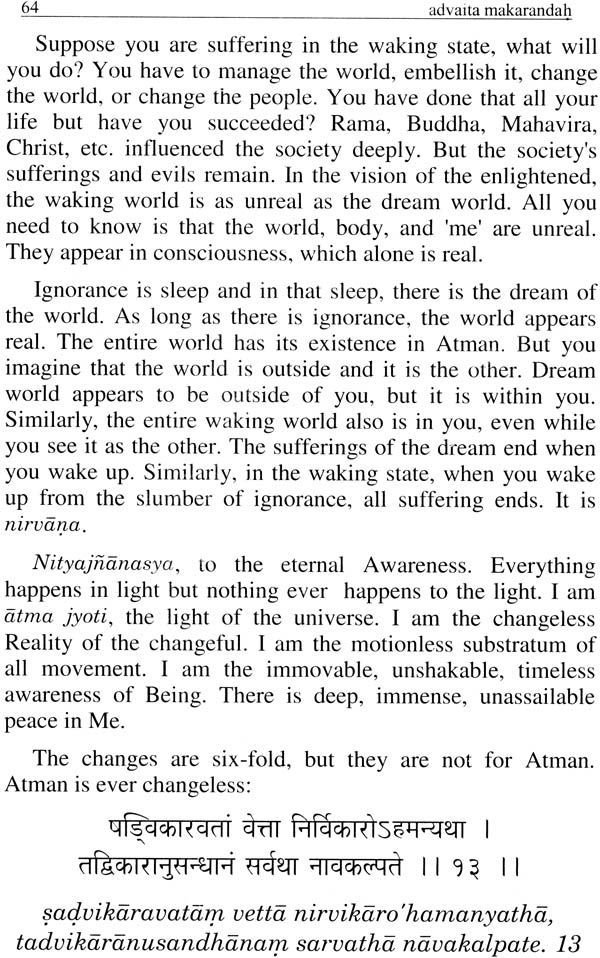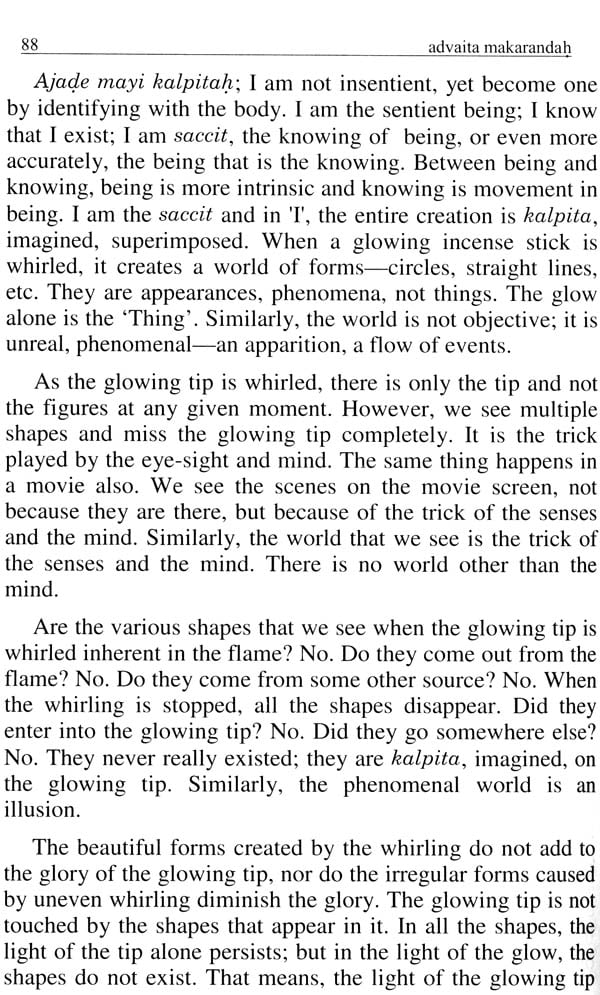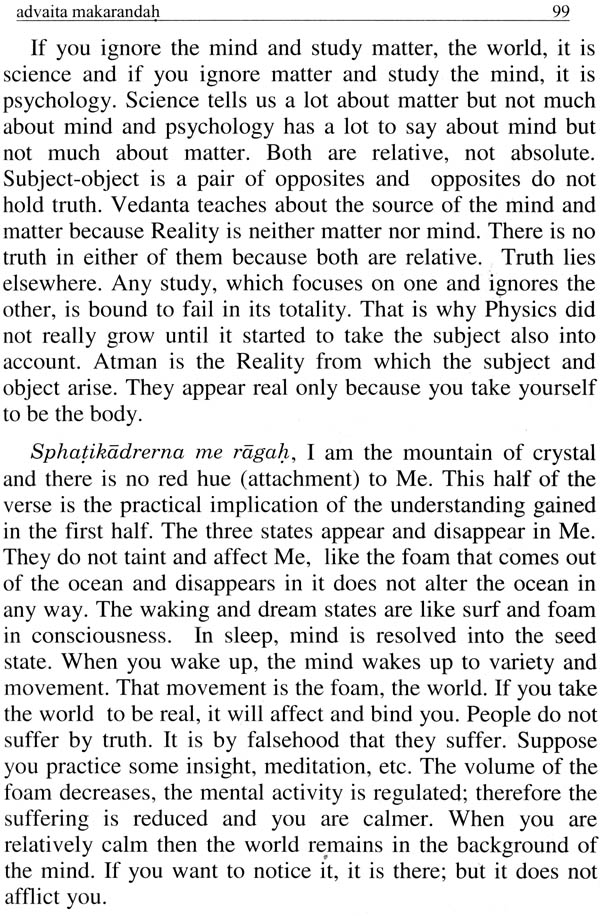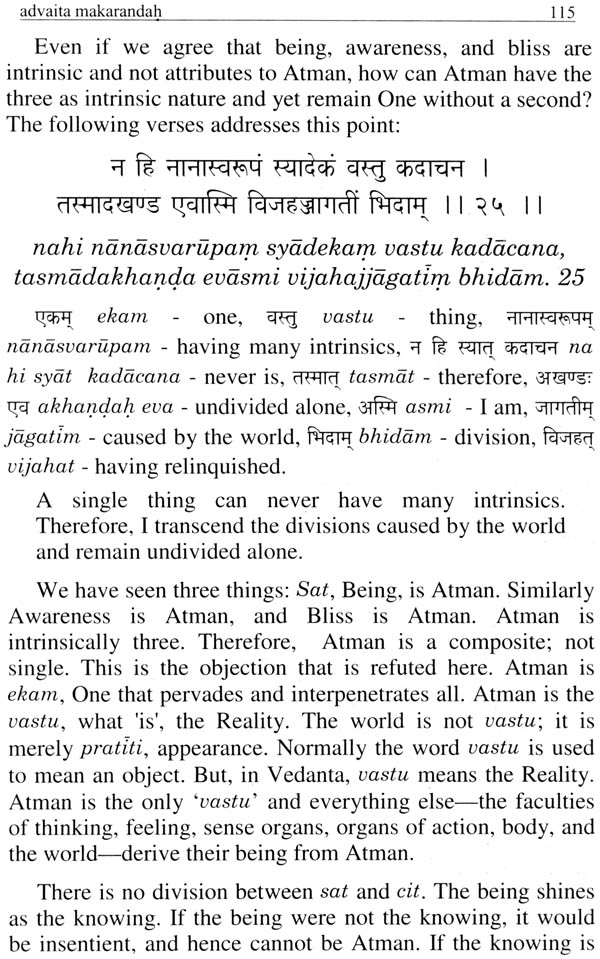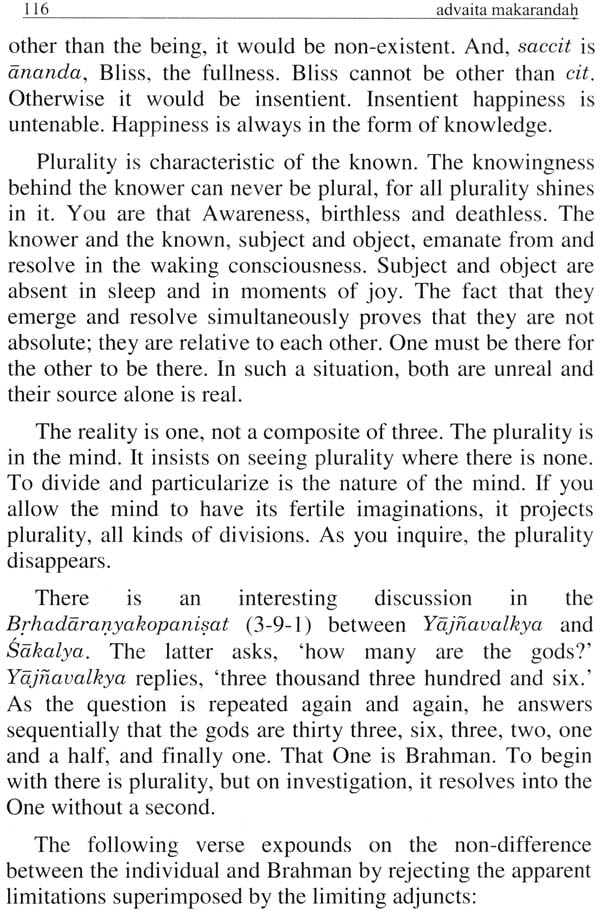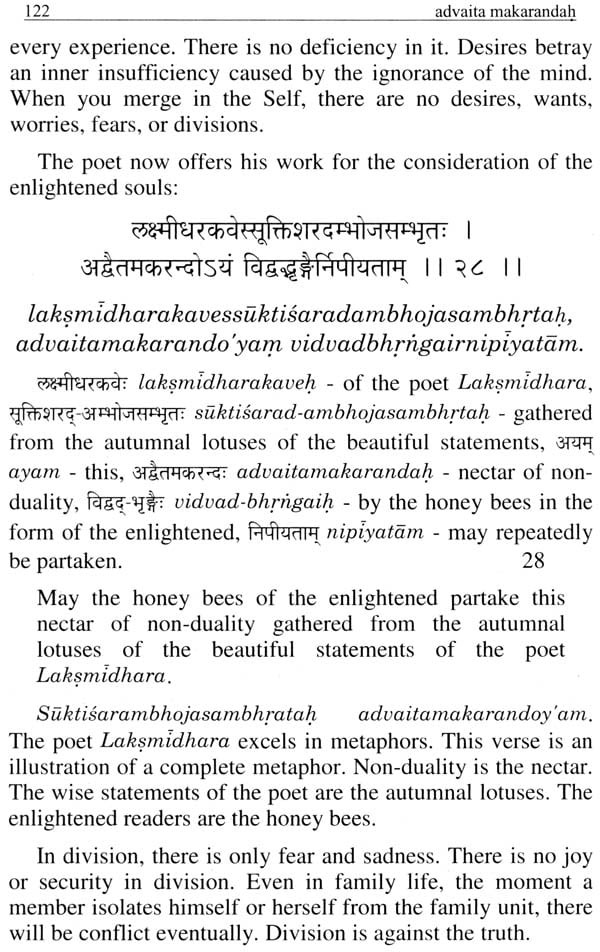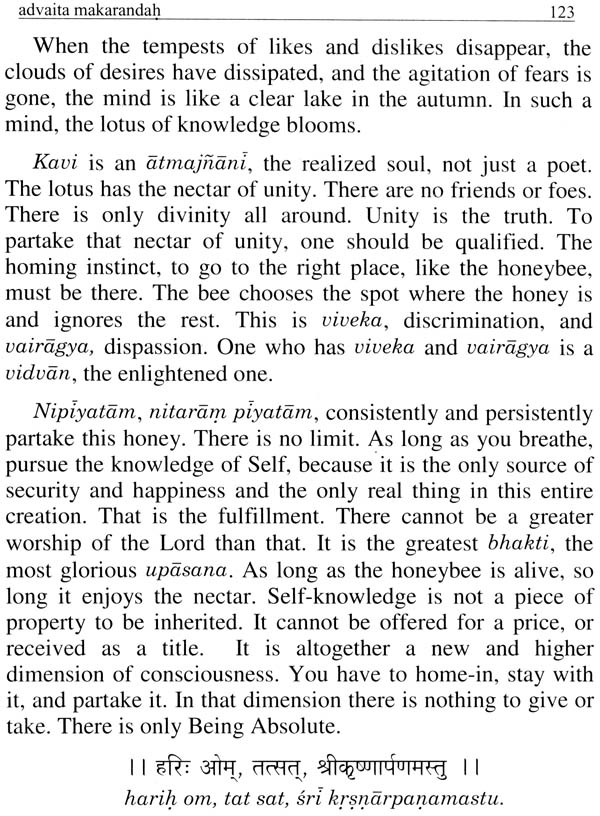
Advaita Makarandah with The Commentary Tattva Prakasika
Book Specification
| Item Code: | NAK557 |
| Author: | Swami Tattvavidananda Saraswati |
| Publisher: | BRAHMA VIDYA KUTEER |
| Language: | Sanskrit Text with Transliteration and Word to Word Meaning English Transaltion |
| Edition: | 2014 |
| Pages: | 141 |
| Cover: | Paperback |
| Other Details | 8.5 inch x 5.5 inch |
| Weight | 190 gm |
Book Description
In Advaita Makaranda, the poet lakshmidhara draws metaphors from the exuberant realms of nature to convey a spontaneous outpouring of the soul. The text is a rare combinations of elegance of poetry and terseness of prose. Its poetic expressions and profound philosophical ruminations lend themselves to the exposition of hte paradoxical concepts of Vedanta. Only a mind capable of soaring to significant heights can offer accurate commentary on such a composition. Swami Tattvavidanandaji unfolds this text wiht a compelling precision of scholar. He distils the essence of the teaching in a way that facilitates the utmost assimilation of the vision.
Swamiji says that he is inspired by the discourses of Sri Nisargadatta Maharaj while teaching this text. Swamiji unfolds the vision with immense clarity and patience.
Swami tattvavidananda Saraswati is a Scientist-turned philosopher, having had his vedic education in childhood, first under the tutelage of his father, a well known Vedanta scholar, late Brahmasri rani narasimha Sastry, mahamahopadhyaya and President award winner. Excelled in his vedic studies even at the tender age of 11, he was encouraged by his teachers to pursue modern academic studies too and thus he did his doctorate in chemistry while nurturing his vedic roots. He also pursued his Sanskrit studies and earned a doctorate in Sanskrit as well.
After a successful stint in a public sector undertaking as a Scientist, he left the service to enter that field which is close to his heart viz. Teaching Vedanta. He later became a sanyasin-disciple of pujya Swami Dayananda Saraswathi of arsha vidya Gurukulam, an acquired greater insights in Advaita philosophy and thus dedicated himself to study and teaching of Advaita philosophy. He has provided excellent telugu translations to Shankara Bhashayam to several Upanishads like Brihadaranya, Chandogy, kena etc and several English books authored by him, Such as Dakshinamurthy Sthothram, Aditya Hridayam, Ganpathi Upanished, Vaidika Sukta Manjari, prarthana shatpadi, Advaita Makarandah have become very popular in USA as also in India.
Special mention has to be made to his monumental work of commenting on Vyasa Bhagavatham, coming in three volumes of which two are already published. He was awarded "Sahitya Puraskar" for his work Bhagavatha Sapthaham in Telugu. An eminent teacher much sought after in USA, Europe, and India, he also finds time to promote the number of service activites.
In Advaita Makaranda, the poet Lahsmidhara draws metaphors from the exuberant realms of nature to convey a spontaneous outpouring of the soul. The text is a rare combination of elegance of poetry and terseness of prose. Its poetic expressions and profound philosophical ruminations lend themselves to the exposition of the paradoxical concepts of Vedanta. Only a mind capable of soaring to significant heights can offer accurate commentary on such a composition. Swami Tattvavidanandaji unfolds this text with a compelling precision of a scholar. He distils the essence of the teaching in a way that facilitates the utmost assimilation of the vision.
The opening verse resonates with Vedantic insight and devotion, setting an appropriate overture to the insightful approaches that follow it.
katiik$akira1).ciciintanamanmohiibdhaye namah,
anantiinandahrsruiya jaganmangtilamiirtaye
The devotee offers his prayerful prostrations namah, unto the lord who by his mere side long glance dries up the ocean of delusion –endless cycle of birth and death. The word namah indicates total surrender. The ocean of delusion refers to the entire gamut of samsara life of becoming beginning wiht ignorance.
Desires for the objects of the world and the fear of losing them, which arises from the notion that they are a source of happiness, is the prime cause for the vicious cycle of becoming, is the prime cause for the vicious cycle of becoming. Surrendering unto the auspicious Lord is the only recourse to be free from the bondage of ignorance.
From the shores of the ocean of delusion, Lakshmidhara takes the reader a quantum leap into a higher dimension to the shores of the boundless reality, anantananda, ananta, limitless and ananda, fullness, which is saccit, Existence and Awareness. Thus, in one verse the entire subject matter of Vedanta jiva devotee, samsara, the world, and Isvara, the Lord is presented concisely.
In the third verse, lakshmidhara analyzes Brahman and the world, whisking the reader to gandharvapattanam, celestial city in the sky, to illustrate the unreality of the world. Swamiji explains.
The celestial city is unreal, mere appearance. The world is a similar appearance, an illusion Base on the evidence of the senses we take the world and the body to be real. When the mind starts moving, the world comes into existence and when it stops, the world disappears. There is no world other than the notion of a world. The world of things exists in the physical space; the physical space containing the world exists in mental space; and mental space has its source of origin in the Awareness.
Everything shines after has its source in Atman, the Awareness. The thought I am ignorant, is a particular rutti modification of the mind, which is illumined by cit, Awareness. Ignorance, the ego, derives its existence form Awareness yet it as though shrouds the Awareness just as fog, which becomes evident due to the light of the sun, creates an illusion of semi darkness by seemingly obscuring the sun (v.17). Ignorance subsists in the absence of inquiry into one's self and becomes a perennial source of suffering samsara. The more it is validated, the more one becomes entrenched in wrong notions such as I am the body, I am sad etc. the rays of the rising sun dissipate the fog without a trance; similarly, upon the innate nature of one's self, through the teaching of sastra reveals the knowledge of Atman and thereby frees the aspirant from the bondage of ignorance .
To maintain an attitude of non-identification, lokshmidhara draws our attention to the vision of witnessing. Swamiji refers to witnessing as a bridge between the seeker's ego and atma, Brahman. The metaphor of the ocean helps the reader to grasp the importance of witness awareness. The relentless rise and fall of waves do not alter the intrinsic nature of the ocean. Which is indivisible and unlimited. Cidambudheh, cit, Awareness is likened to the ocean because it transcends space time divisions and ocean because it transcends space time divisions and limitations. When movement, creation, proceeds from it. It remains motionless as an unattached witness.
Manas spandana matrameva jagat, the creation (world of names and forms) is a projection of the mind. The nature of the mind is to divide. Indentification with the division results in rigid expectations, which bind. This is ego's arena. It subsists on division and consequently gains strength. Ego's grip is tenacious. It enslaves the person so thoroughly that he or she appears to be a marionette in its clutches.
Abiding as witness to the dynamics of the mind neutralizes the ego. Ego loses its power over its prey desires and fears. The heart regains its austere purity and the seeming division resolves in the witness. When there is nothing other than the witness, pure Awareness alone remains just as when the lashing waves are resolved in their source, the ocean, only the placid surface is evident.
For an average mind, the submission of the ego, with its cumulate exaltations and exasperations of life, to a hitherto unknown entity is inconceivable. Nevertheless, witnessing can make that state possible. It is imperative to transcend the grip of yesterday's loses and tomorrow's apprehensions and recognize one's true nature as the nistaranga cidambudhih waveless ocean.
In verse 21, Atman is presented as amrtabdhi, ocean of nectar. The play of surf, bubbles, and waves on the surface of the ocean is transient. They emerge from and merge into the ocean but the ocean remains ever the same. Likewise, the plurality of the world is a mere appearance. It has its being in Awareness. The peak of a crystal mountain reflects the stunning panorama of the twilight sky in a dazzling spectrum of kaleidoscopic colors. When the display ends, the crystal peak appears in its pristine form. In the same manner, the changes birth death etc. that the names and forms of the world constantly undergo, happen on the field of Awareness but Awareness remains unaffected.


